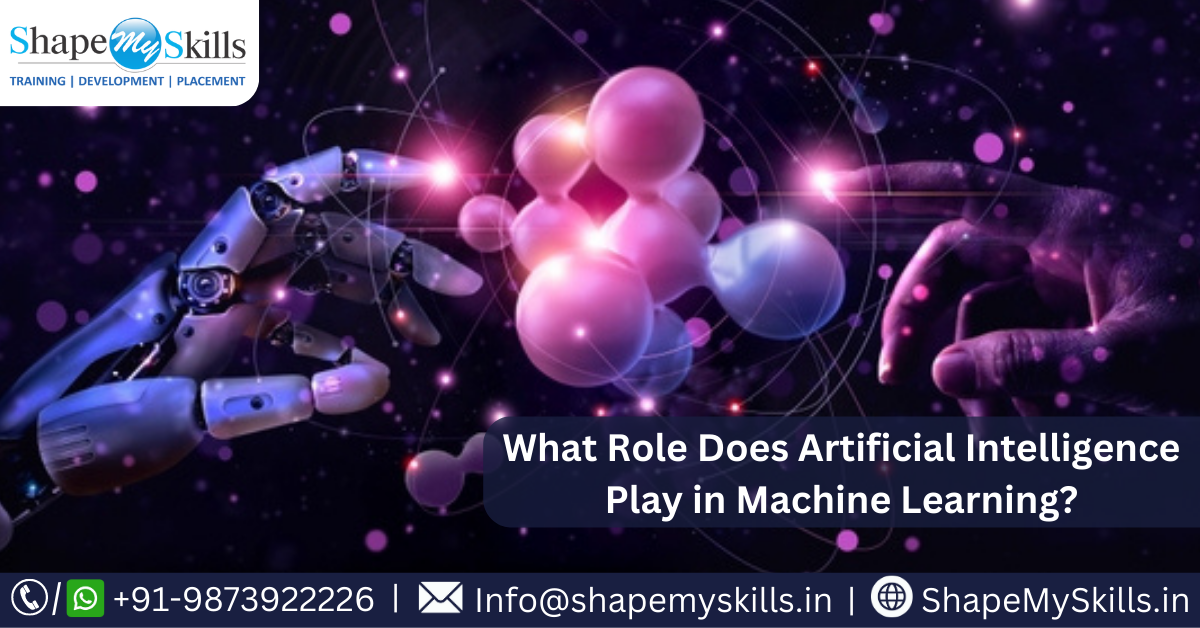Can Machines Really Make Predictions? Magic of Machine Learning
…

Artificial Intelligence (AI) and Machine Learning (ML) are two transformative technologies that are driving innovation and reshaping various industries. While they are often used interchangeably, AI and ML are distinct but interconnected concepts. Machine Learning Training in Noida provides individuals with the opportunity to understand the intricacies of ML algorithms, data processing, model selection, and optimization. In this blog, we will explore the role of AI in machine learning and understand how these technologies work together to revolutionize modern applications.
Artificial Intelligence refers to the simulation of human intelligence in machines that are programmed to mimic cognitive functions such as learning, reasoning, problem-solving, and decision-making. AI can be categorized into two types: Narrow AI (Weak AI) and General AI (Strong AI). Narrow AI is designed to perform specific tasks and is prevalent in most AI applications today. On the other hand, General AI aims to possess human-like intelligence and adaptability.
Machine Learning is a subset of AI that involves training algorithms to learn patterns and make predictions or decisions from data without explicit programming. ML algorithms improve their performance over time as they are exposed to more data, making them highly effective in handling complex tasks.
AI plays a crucial role in advancing machine learning capabilities, providing the framework and resources for ML algorithms to learn and adapt effectively. Here are some key roles that AI plays in machine learning:
Machine learning models heavily rely on data for training and making predictions. AI-powered systems can efficiently process vast amounts of data, including structured and unstructured data, to prepare it for ML tasks. AI algorithms can clean, transform, and analyze data to extract valuable patterns and features, facilitating more accurate and meaningful learning for ML models.Machine Learning Course helps learners to explore all the important algorithms.
Feature extraction is a critical step in ML, where relevant and informative features are identified from the data. AI techniques, such as natural language processing (NLP) and computer vision, play a significant role in feature extraction and selection, especially when dealing with complex and high-dimensional data. By enrolling in Machine Learning Training in Delhi, learners gain hands-on experience in leveraging NLP and computer vision algorithms to identify essential features for ML models, reducing the risk of overfitting and enhancing the performance of their machine learning projects.
AI helps in selecting the appropriate ML model for a specific task based on the problem’s characteristics and data type. AI-driven algorithms can compare different ML models, tune hyperparameters, and optimize the model’s architecture to achieve better performance. This process, known as hyperparameter optimization, is essential for creating accurate and efficient ML models.
AI enables ML models to undergo continuous learning and adaptability. Through AI-powered reinforcement learning, ML models can learn from feedback and adjust their strategies to achieve better results over time. This capability is particularly valuable in dynamic environments where data distribution and patterns change frequently.
NLP is a specialized field of AI that focuses on the interaction between computers and human language. NLP algorithms enable ML models to understand, interpret, and generate human language, making them invaluable for applications like sentiment analysis, chatbots, and language translation.
Computer vision, another domain of AI, enables ML models to analyze and interpret visual data, such as images and videos. With computer vision capabilities, ML models can recognize objects, detect patterns, and make decisions based on visual information, leading to advancements in fields like autonomous vehicles, medical imaging, and surveillance.
Artificial Intelligence plays a pivotal role in advancing the capabilities of Machine Learning. From data processing and analysis to model selection and optimization, AI-powered techniques enhance the performance and adaptability of ML models. Machine Learning Online Training equips learners with the knowledge and helps to explore the right career path and skills to effectively perform feature extraction using AI techniques such as natural language processing (NLP) and computer vision. These AI-powered techniques are particularly valuable when dealing with complex and high-dimensional data.As AI and ML continue to evolve, their integration will lead to even more powerful and intelligent systems that can revolutionize industries, automate complex tasks, and provide innovative solutions to societal challenges. The synergy between AI and ML is at the heart of the ongoing AI revolution, paving the way for a future where intelligent machines work alongside humans to transform the world we live in.
